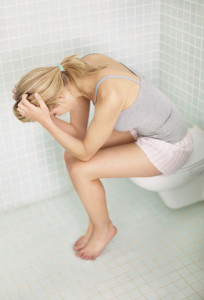Endometriosis can be a seriously debilitating disease. At least 176 million women worldwide suffer from symptoms of endometriosis and many women with this condition experience unbearable period pain that leaves them dreading that time of the month. They may also suffer from pelvic pain in between periods, pain during sex, bowel movements or urination, heavy periods, bloating, constipation, diarrhoea, nausea, headaches, fatigue, infertility and more. The severity of symptoms varies widely but some women describe vomiting from the pain, being incapacitated for many days most months or lying curled on the bathroom floor – literally floored by the pain. This disease seriously affects the quality of life.
WHAT IS ENDOMETRIOSIS?
Endometriosis means that the type of blood-rich tissue (endometrium) that normally occurs inside your uterus and sheds during your period also occurs in other areas such as ovaries, fallopian tubes, the pelvic cavity and even the walls of the bowels, vagina and urinary tract. Like the lining of your uterus, the endometrial tissue in endometriosis also grows and thickens during your cycle and sheds (bleeds) during menstruation. This causes lots of inflammation and pain and can cause scarring, which may lead to fertility problems.
DO I HAVE ENDOMETRIOSIS?
Not all women with pain have endometriosis but equally, if you don’t have pain it doesn’t mean you don’t have endometriosis. If you are experiencing any of the symptoms of endometriosis and they are affecting your quality of life, it is worth speaking to your health practitioner about investigating. This is especially true if you have a family member with known endometriosis as it does tend to run in families.
The only way to be 100% certain you have endometriosis is to have a laparoscopy – where they insert a telescope-like device through your belly button and have a look around. This is done under general anaesthetic so often if endometriosis is found it is removed during the same procedure.
You and your doctor may decide that laparoscopy is not necessary and often ultrasound, as well as symptoms, are used to guide this decision.
HOW TO END ENDOMETRIOSIS SYMPTOMS
We don’t know exactly what causes endometriosis but we do know that inflammation is at its core, and the inflammation is thought to come from immune system imbalance and possibly the imbalance of gut bacteria too. Inflammatory substances promote the growth and survival of endometrial tissue in places outside the uterus (endometriomas).
Endometriosis is impacted by hormones because these stimulate the tissue to grow and shed during the menstrual cycles leading to pain, however, they are not thought to be the driving factor behind the disease.
Medical options
Your medical doctor can offer these treatments:
- Hormonal medications such as the contraceptive pill – these stop or limit the growth of endometriosis by suppressing the normal menstrual cycle. If you decide to take the pill it is worth noting that over the long term it can lead to an imbalance of gut bacteria and a depletion of certain nutrients so it is wise to support with supplementation and a good diet. It can also cause side effects like mood changes, headaches, blood clots and changes in libido so these are important to consider as part of your informed decision.
- Pain relief medications – these block the pain and offer relief but don’t stop the progression of endometriosis. For some women, they are not enough to fully mask the pain during menstruation, where it can be at it’s worst. Side effects with chronic use include gut inflammation/ulcers, constipation and stress on your liver’s detoxification capacity. No one should have to suffer the pain of endometriosis without relief, so if painkillers are needed, herbs and nutrients can be given alongside to protect against side effects or to minimise the amount needed.
- Laparoscopic surgery can remove the endometriosis but it should be noted that regrowth often occurs along with possible further scarring so again weigh up your options carefully.
Diet
Diet can be a very powerful way of managing endometriosis by reducing inflammatory processes. You do need to stick with it consistently to see results, so work at making it a way of life and finding meals you enjoy.
Anti-inflammatory foods to include:
- Omega 3 fats – oily fish like sardines, anchovies, trout and salmon, chia seeds, flax seeds, walnuts
- Selenium – Australian soil is deficient in this mineral so you can get it from eating Brazil nuts not grown in Australian soils (eat 5 nuts per day)
- Fruits and veggies – green leafy veg, berries and pineapple with the core are key
- Spices – include turmeric and ginger in your diet daily if possible. Other spices like cumin, ground coriander, cardamom and cloves are also beneficial. Find recipes containing these or just sprinkle them over roast veggies while cooking.
Inflammatory foods to avoid:
- Sugar and refined carbohydrates including natural sugars such as honey, white bread, pasta, pastries, cakes, cookies etc. Limit your fruit intake to two pieces per day.
- Dairy – ideally exclude dairy completely until your symptoms have improved, however, some people do well with small amounts of goat’s, sheep and buffalo cheese, and organic natural yoghurt.
- Too much red meat – studies show that people who eat two servings of red meat every day were 56% more likely to have endometriosis than women who ate it once per week or less. It is thought that this effect could be to do with the fat content of the meat or the hormones injected into the animals so it may help to go for lean cuts of organic meat and limit overall intake. Many women with endometriosis have heavy periods and are prone to iron deficiency so be sure to have your iron levels checked if you reduce red meat and supplement if necessary.
- Alcohol – ideally avoid this completely until your symptoms improve. Some women do ok on no more than four standard drinks per week and no more than two in any one sitting. Quality red wine is best
- Gluten? Research indicates that quitting gluten decreases pain for most women with endometriosis. An 8-week gluten free trial is a good starting place but it may take up to 12 months to see significant results.
Interestingly, eating an anti-inflammatory diet as described above is also good for nurturing the growth of good gut bugs which research is indicating is linked to reducing endometriosis when we have healthier colonies of bugs in our system.
My top 4 natural medicines for endometriosis
- Maritime pine bark
This powerful anti-inflammatory herb has performed well in research, decreasing both period pain and pelvic pain (pain when you don’t have your period), as well as pelvic tenderness when taken for 3-6 months. It has the ability to improve quality of life and reduce pain medication use in women with endometriosis. Particularly for women with smaller endometriomas, it may be a viable alternative to some medical treatments but please consult with your health practitioner to determine this. - N-acetylcysteine
This nutritional supplement has also performed well in research. 600mg taken three times daily over three months was shown to shrink or prevent further growth of endometriomas on the ovaries of women, significantly improving pain levels. This is exciting research as it indicates that n-acetylcysteine may be able to out-perform other forms of treatments. - Zinc
Zinc is an anti-inflammatory mineral and research shows that women with endometriosis have lower levels of zinc than those without. There is such thing as too much though so this mineral shouldn’t be taken for more than three months without the guidance of a health professional. - Turmeric
This is one of the most powerful anti-inflammatory herbs we know of. Its broad spectrum against a wide range of inflammatory factors makes it ideal for tackling endometriosis. A high strength, high-quality turmeric supplement is needed to have an effect as turmeric is generally not well absorbed by the gut. These are generally available through your naturopath as the high-quality turmeric products are mostly in the “practitioner only product range” and can’t be sourced over the counter.
Whether you are currently on medications or not, a proactive natural health plan such as dietary changes, herbs and nutrients have a lot to offer when it comes to ending the pain, suffering and disruption to life that endometriosis may cause. Natural medicines need to be consumed consistently every day to get results and bear in mind that surgery may be additionally needed to really get on top of the disease. If you have extensive gut problems you may need to work with a naturopath to repair this. Diet will be a core part of both your treatment and maintenance plan so it should be the main focus – work at making it a way of life and reap the rewards.
You may also be interested in
- Information about our Consultant Hormone Naturopath, Nurse, Midwife, Lecturer & Author (28 yrs experience)
- What Causes PCOS?
- PCOS Diet
- 7 Ways to Boost Fertility Naturally
- Get Your Diet Right For Fertility
- Top 5 Tips for Avoiding Chemicals That Harm Fertility
- What’s your 5 Day Fertile Window?



